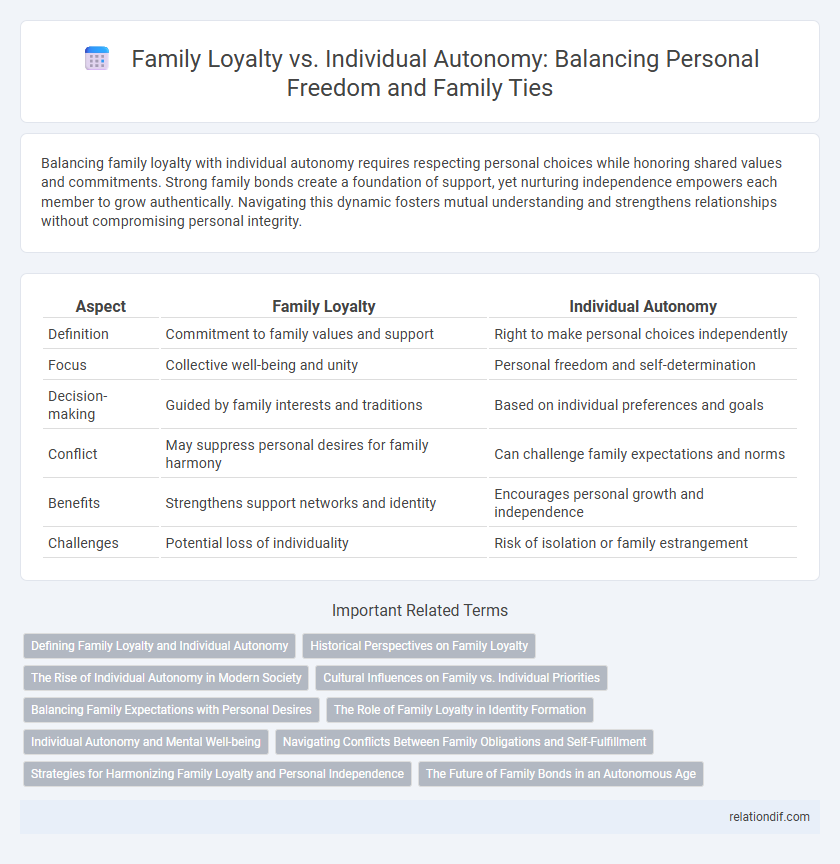Balancing family loyalty with individual autonomy requires respecting personal choices while honoring shared values and commitments. Strong family bonds create a foundation of support, yet nurturing independence empowers each member to grow authentically. Navigating this dynamic fosters mutual understanding and strengthens relationships without compromising personal integrity.
Table of Comparison
| Aspect | Family Loyalty | Individual Autonomy |
|---|---|---|
| Definition | Commitment to family values and support | Right to make personal choices independently |
| Focus | Collective well-being and unity | Personal freedom and self-determination |
| Decision-making | Guided by family interests and traditions | Based on individual preferences and goals |
| Conflict | May suppress personal desires for family harmony | Can challenge family expectations and norms |
| Benefits | Strengthens support networks and identity | Encourages personal growth and independence |
| Challenges | Potential loss of individuality | Risk of isolation or family estrangement |
Defining Family Loyalty and Individual Autonomy
Family loyalty represents the commitment and allegiance members show toward one another, emphasizing trust, support, and collective responsibility. Individual autonomy refers to the capacity of family members to make independent decisions and pursue personal goals without undue influence. Balancing these concepts requires understanding that family loyalty fosters unity while individual autonomy promotes personal growth and self-expression.
Historical Perspectives on Family Loyalty
Historical perspectives on family loyalty reveal its vital role in maintaining social cohesion and transmitting cultural values across generations. In many traditional societies, individual autonomy was often subordinate to collective family interests, with loyalty serving as a foundation for social order and economic stability. Shifts in modernity and individual rights have gradually redefined these dynamics, balancing personal freedom with enduring familial obligations.
The Rise of Individual Autonomy in Modern Society
Modern society increasingly values individual autonomy, prioritizing personal freedom and self-expression over traditional family loyalty. This shift reflects broader cultural changes influenced by globalization, digital connectivity, and evolving social norms that empower individuals to define their own identities and life paths. As a result, family dynamics now often balance respect for collective bonds with support for personal independence and goals.
Cultural Influences on Family vs. Individual Priorities
Cultural influences significantly shape the balance between family loyalty and individual autonomy, with collectivist societies prioritizing familial obligations and interdependence over personal freedom. In contrast, individualistic cultures emphasize self-expression and personal goals, often encouraging members to pursue their own paths even at the expense of family expectations. This divergence impacts decision-making, social roles, and emotional bonds, highlighting the complex interplay between cultural values and family dynamics.
Balancing Family Expectations with Personal Desires
Balancing family expectations with personal desires requires navigating the complex dynamics between family loyalty and individual autonomy. Prioritizing open communication and mutual respect helps maintain strong family bonds while allowing personal growth and self-expression. Establishing boundaries ensures that individual goals align with family values, fostering harmony and support within the family unit.
The Role of Family Loyalty in Identity Formation
Family loyalty plays a crucial role in identity formation by providing a foundational sense of belonging and shared values that shape individual self-concept. The emotional bonds and expectations within families influence decision-making and behavior, often balancing personal autonomy with collective responsibilities. Strong family loyalty fosters resilience and continuity, reinforcing cultural heritage while individuals navigate their unique paths.
Individual Autonomy and Mental Well-being
Individual autonomy within family dynamics fosters personal growth and strengthens mental well-being by allowing members to express their true selves without fear of judgment. Prioritizing self-determination reduces stress, anxiety, and depression, promoting healthier relationships grounded in mutual respect. Maintaining boundaries and respecting each other's independence supports emotional resilience and long-term family harmony.
Navigating Conflicts Between Family Obligations and Self-Fulfillment
Balancing family loyalty and individual autonomy often requires clear communication and setting boundaries that honor both obligations and personal growth. Prioritizing self-fulfillment while respecting family expectations helps reduce resentment and fosters healthier relationships. Navigating conflicts involves mutual understanding and compromise to achieve harmony between collective responsibilities and individual aspirations.
Strategies for Harmonizing Family Loyalty and Personal Independence
Balancing family loyalty and personal autonomy requires clear communication and mutual respect to ensure individual goals coexist with family values. Establishing boundaries while honoring family traditions fosters harmony and supports personal growth without sacrificing familial bonds. Emphasizing empathy and flexibility allows family members to navigate conflicts and celebrate diverse aspirations within the family unit.
The Future of Family Bonds in an Autonomous Age
Family loyalty remains a foundational value that shapes intergenerational support networks and emotional resilience in many cultures. However, rising emphasis on individual autonomy fosters personal growth and self-expression, challenging traditional family hierarchies. The future of family bonds depends on balancing collective commitment with respect for individual independence in an increasingly autonomous age.
family loyalty vs individual autonomy Infographic

 relationdif.com
relationdif.com